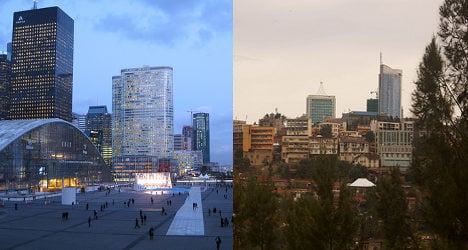There was yet more grim news for the French economy on Tuesday, as a new report by the World Bank (see below) revealed that France ranks behind the US, UK, Ireland, Germany, and even Saudi Arabia and Rwanda, when it comes to being an attractive place to do business.
The annual “Doing Business” report revealed that France had dropped three places down the pecking order from last year, to 38th in the world compared to last year.
According to the rankings, the Eurozone’s second-largest economy is a less attractive place to have a company than all of the Scandinavian countries – Denmark (#5), Norway (#9), Finland (#12) and Sweden (#14).
The country's finance chiefs will not be pleased to find out that France was also ranked below the likes of Georgia, Lithuania, Chile and Armenia.
The study used 10 criteria to determine how easy (or difficult) it is to conduct business in any given country, ranging from filing taxes and enforcing contracts to getting electricity and obtaining construction permits.
Shockingly, France ranks 149th in the world – behind Uzbekistan and Iraq – for the ease of registering a property, that is “the steps, time and cost involved in [purchasing] land a building that is already registered and free of title dispute,” as the report explains.
The OECD average for that procedure is 24 days. In France, it takes an average of 49 days.
Dealing with construction permits, for example, has also become a more serious stumbling block in France since last year, with a drop from 74th place to 92nd, behind the United Kingdom, the US, and Tonga.
Among the OECD countries, it takes an average of 147 days to get the right building permits, whereas it takes just 26 days and 11 steps in Singapore.
In France, it takes an average of 184 days, but the paperwork costs nearly three times more than the OECD average.
This chart shows the 10 measures of attractiveness used by the World Bank, and how France ranks for each one of them:
The world’s most attractive country to do business this year was Singapore, according to the report, followed by Hong Kong, New Zealand, the US and Denmark (see below).
At the other end of the spectrum, not surprisingly, were the struggling or conflict-ridden African nations of Chad, the Central African Republic, Libya, South Sudan and the Democratic Republic of the Congo.
This isn’t the first time in recent weeks that France’s global competitiveness has been severely dented.
Earlier this month a survey by US consultants Bain & Company, along with the American Chamber of Commerce in France, found that only 13 percent of US companies having invested in France saw it as attractive place to do business.
Of the employees surveyed by the Chamber of Commerce, only nine percent would strongly recommend France to their fellow Americans as a country to come and work.
Marc-André Kamel from Bain told The Local that American cautiousness about setting up in France was down to a lack of clarity and predictability in French economic policy, complicated employment laws, and high levels of personal income tax.
Below is the report in full, and in English, from the Doing Business 2014 website, where you can perform some deeper analysis and cross-check specific data.
The main rankings are on page 11 of the PDF document.
*This article has been updated with a different picture of the Rwandan capital Kigali. The first photo used was inappropriate to use in comparison with Paris.
Don't miss a story about France – Join us on Facebook and Twitter




 Please whitelist us to continue reading.
Please whitelist us to continue reading.
Member comments